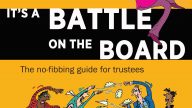No one wins when we treat political parties like football teams
All political parties, and their leaders, do both great stuff and awful stuff. We must assess their actions away from a ‘goodies’ and ‘baddies’ narrative.
Our niece, Sophie, as a toddler, decided for some unfathomable reason that she didn’t like the taste of pork (even though she had never actually eaten it). One Sunday we served roast pork and she devoured it enthusiastically because she thought it was chicken.
When she’d finished we told her it was pork, fully expecting her to say: “Oh, I’ve changed my mind. I love pork.” How wrong we were!
We completely failed to account for the fact that Sophie had already declared an antipathy to pork, and liking the taste was not going to change that. Her decision had been made!
So, she remained steadfastly loyal to chicken and determinedly anti-pork.
I tell this story because I think it’s a great allegory for how we make decisions about what we do and don’t like in life, and in politics in particular.
We can’t always remember why we decided what we did (although human beings are brilliant at post-rationalisation!) but once decided, we don’t budge.
It’s always seemed to me that a fair few folk treat political parties a bit like football teams. We pick a side at some point in our life and then stay loyal to them regardless.
But I think that what might work for football, or indeed food, is highly dangerous in politics.
When I hear people say “I would never vote Tory,” or “I would never vote Labour,” it doesn’t feel to me like rational consideration of the options.
All political parties, and their leaders, do both great stuff and awful stuff. If we can’t assess what they do without hanging on to our firm conviction that they are either the goodies or the baddies, then I think we are sacrificing our critical faculties on the altar of unbreakable loyalty to one side or unswerving antipathy to the other.
A friend of mine loathes Tony Blair because of Iraq – as do many others – and refuses point-blank to acknowledge any successful policies, such as Sure Start, for example. Ergo anything Labour = eeeevil!
Another friend absolutely hates David Cameron because of the Brexit referendum and cannot see past that to recognise his legislation recognising gay marriage was profoundly brave and important. Ergo anything Tory = baaaad!
The reality of all human life is that none of us are perfect heroes and few of us are out-and-out villains. We’re complex, interesting, flawed human beings with a multiplicity of sides and views, sometimes, if not often, contradictory.
It’s so critical for our sector to remember that. Whatever we think of an incoming government, or a new opposition, we need to set aside partisan loyalty and be neither uncritically forgiving of those we approve of, nor hyper-critical of those we don’t.
Our job is to consider what those we serve need and how best to get it for them, regardless of who it is we have to ask or work with in order to do that.
We don’t have to pick a ‘side for life’ in politics. It’s not a Sunday roast and it’s not a football team – it’s way more important than that.
This article was first published on the Third Sector website, take a look here.


